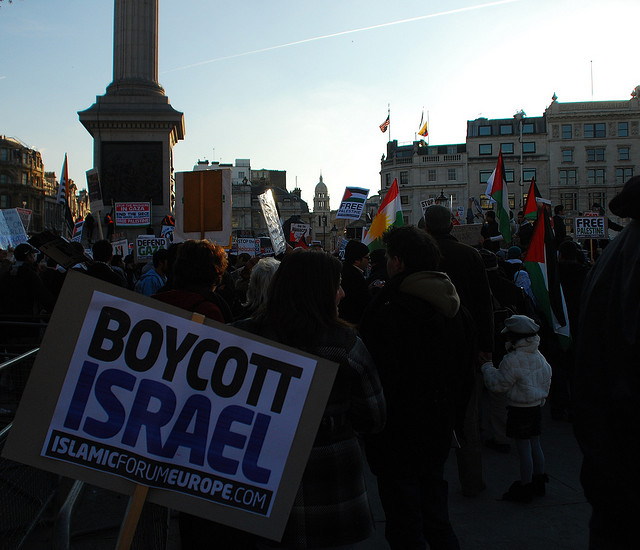The arguments used by the British academics who clled for boycott on Israel are demonstratively false: Israel does not illegally occupy “Palestinian land,” and Israel does not resist a feasible settlement with the Palestinians.
On October 27, the Guardian published a full-page advertisement by 343 British academics calling for the boycott of Israel until it ends its “illegal occupation” of “Palestinian land” and until it stops “resisting” any “feasible settlement.” On October 23, Professors Steven Levitsky of Harvard University and Glen Weyl of the University of Chicago published an op-ed in the Washington Post in which they called for the boycott of Israel out of “love for Israel and desire to save it.”
While the 343 British signatories claim to act out of concern for the Palestinians, the two above authors justify their move by their concern for Israel. The intentions of these 345 academics might be sincere. Their arguments less so.
Those arguments are demonstratively false: Israel does not illegally occupy “Palestinian land,” and Israel does not resist a feasible settlement with the Palestinians.
The 1949 armistice agreement between Israel and its Arab aggressors established a temporary armistice line—not a final international border—between Israel and Jordan. Jordan took control of a sizable part of the former British mandate, known today as the “West Bank”, and annexed it in 1950. This annexation was not recognized by the international community, with the exception of Britain and Pakistan. When Israel took control of the West Bank after being attacked by Jordan in June 1967, this territory had not previously been legally and legitimately under Jordanian sovereignty. Only territories conquered from a recognized sovereign state can be considered occupied.
This is why U.N. Security Resolution 242 does not require an unconditional Israeli withdrawal to the 1949 armistice lines, but withdrawal “from territories” to “secure and recognized boundaries” in exchange for peace. There is therefore nothing illegal about Israel’s partial presence in the West Bank—whose Arab population has been ruled by the Palestinian Authority since 1995—certainly as long as there is no peace agreement between Israel and the Palestinians.
Is Israel to be blamed for the absence of such an agreement? The 343 British academics and Professors Levitsky and Weyl claim so. Here also, they are wrong. When the partition of British Palestine was proposed by the Peel Commission in 1937 and then by the United Nations in 1947, it was accepted by the Jewish leadership and rejected by the Arab leadership on both occasions. At the Camp David Conference in July 2000, Israeli Prime Minister Ehud Barak offered PLO leader Yasser Arafat to establish a Palestinian state on all of the Gaza Strip and 92 percent of the West Bank, with Palestinian sovereignty over the Arab neighborhoods of East Jerusalem. Arafat rejected the offer.
In December 2000, U.S. President Bill Clinton suggested to extend Palestinian statehood to 96 percent of the West Bank, over the Arab quarters of the Old City of Jerusalem, and over the Temple Mount. The Israeli government accepted the “Clinton parameters” but Arafat rejected them. In September 2008, Israeli Prime Minister Ehud Olmert offered Arafat’s successor, Mahmoud Abbas, to establish a Palestinian state over the entire West Bank—with mutual land swaps and the removal of Israel’s isolated settlements—to transfer sovereignty over the Temple Mount and the “holy basin” to an international trusteeship, to accept thousands of Palestinian refugees to Israel, and to establish a safe passage between the West Bank and the Gaza Strip. Abbas said he would think about it and get back to Olmert. He never did.
Precisely because Israel despaired of the Palestinian leadership, and because Israel feared the demographic and international consequences of the status quo, it decided to act unilaterally by pulling out from the Gaza Strip in 2005. As a result, Hamas took over the vacated territory and shelled Israeli cities with dozens of thousands of missiles, thus triggering three wars—in 2008, 2012, and 2015. Were Israel to repeat the experience to the West Bank, the outcome would be similar on a worse and larger scale.
Thus is Israel in a Catch-22 situation: the Palestinians will not end the conflict no matter what Israel offers; the status quo is demographically untenable; unilateral pullout will drag Israel into recurrent wars with another and larger Hamas-run failed state.
Hence my question to Professors Levitsky and Weyl, and their British colleagues. Assuming that Israel re-submits an Olmert-like proposal to Mahmoud Abbas and that he rejects it again, and assuming that, as a result, Israel unilaterally pulls out from the West Bank. Will you, then, end your boycott of Israel? Or will you maintain it in order to protest the deadly military operations that Israel will be compelled to conduct on a regular basis in order to temporarily stop the shelling of its cities?
Unless you answer this question positively and convincingly, you will have a hard time convincing pragmatic Israelis like me to take bold steps just for you to book a flight again to Tel-Aviv.



